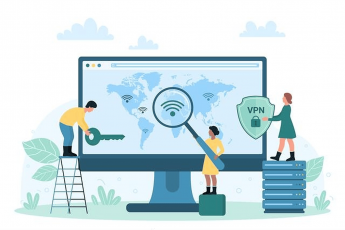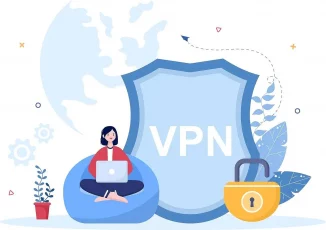People comparing the use of security tools like VPN, firewalls, and antivirus is quickly becoming an ever-growing trend online. Why? The virtual realm is stranger than fiction today, and every internet user like you needs to protect themselves.
Have you ever wondered how a single search on a particular item, say sneakers, floods your online activity with countless advertisements featuring sneakers?
There is a lot more than what meets the eye with the internet. The device you are on is connected to the worldwide web, encrypting, and decrypting data relevant to your likes from algorithms to saved cookies. In short, whatever you do on the internet gets tracked and saved.
You are a commodity in the virtual domain, and the significant entities reigning the internet thrive on your personal data. The ads you click are their income, and your preferences get compiled and collected to be sold to prominent names.
While it makes total sense to use tools like VPNs, antivirus software, and firewalls to have a safer internet experience, many people are unaware of exactly what each of these tools does.
That is precisely what this guide is going to clear on your mind. But first, let’s cover some fundamental security stuff that you need to be aware of no matter whichever tool among three you use to protect your security.
The most-ignored online threat
For most of us, we would instead find it helpful for the web to serve us with just what we were looking for but does it all just end up there? Let us take it from the top; when you log onto a site and search your desired product or service, the site saves your search activity in the form of encrypted data called “cookies.”
Some websites will ask for your permission to save your online activity, and some won’t. In either case, a site does that through cookies tracking. The question is, is it safe for you to have them accessing your searches?

Most E-commerce stores will manipulate you into buying something you never needed. What if you needed an insurance cover, and the site you logged onto now has access to your previous searches? Based on that info, the insurance firm may now deny you insurance because of your search history.
If none of that is your concern, you still have the ‘invasion of privacy” factor to worry about. Much like how you like your door shut in the night, you don’t always need ads to intrude on you on your virtual space.
That brings us to the innovation of VPN software packages and firewalls. It turns out, the need for a VPN becomes crucial as we speak.
Users have had their own take on VPN software providers, highlighting the pros and cons. Why may you ask? Well, read on for more.
What is the difference between a VPN, a firewall, and anti-virus software?
A Virtual Private Network (VPN) is much what it says in the name. It creates a private network for you from a regular internet connection. The advantage is, it conceals your Internet Protocol (IP) address, which cuts you off from your search history.

On the other hand, a firewall is a software that operates as a virtual wall denying access to sites, attack vectors, or even malware from accessing your data.
Any entity that has been identified already as a threat will get blocked automatically. Lastly, antivirus software is designed to detect malicious codes and computer viruses, simultaneously destroying the lot.
Now that all that is out of the way, it begs the question: Do I need a VPN when I have a firewall? The relationship between the two is complicated. Let’s explore the clauses.
VPN vs. firewall
A VPN works its way through discreet encryption codes. When you browse through a VPN, the websites you logged onto see the VPN’s IP address instead of yours.
A VPN can also help you access sites that are blocked in your country. Any trackers on a portal you accessed will not be able to trace you back. It also comes in handy when you are using public Wi-Fi. Believe it or not, data theft gets a lot easier when you are using public Wi-Fi.
Let’s sum down all that a VPN renders in bullets:
- A VPN masks your IP address and secures your internet connection, but it does not protect your device from malware and viruses.
- A VPN comes with a Killswitch feature that destroys internet access. However, a VPN does not restrict unwanted data from entering your computer.
A Firewall, on the other hand, is almost always in-built. It blocks away potential threats and keeps your device and your data from getting attacked by hackers, malware, and even viruses.
When it comes to the question of VPN vs. Firewall, the VPN surely wins the race as a Firewall is customary with every Windows suite and even with smartphone software. Nonetheless, we cannot underestimate all that a Firewall harnesses you with:
- A firewall lets you customize the settings in a way, you can set up your own rules on how your computer operates on the internet.
- It can restrict your computer from accessing certain sites. It is perhaps more relevant for a computer that is used by the under-aged lot.
VPN vs. antivirus
VPN software providers take a run for their worth when it comes to the best antivirus software. VPNs mask your original IP address and prevent third parties and even the site you visit from gaining access to sensitive data (like your credit card credentials).
An anti-virus software, however, prevents your very device from getting invaded by malicious malware.
Both operate on a different scale. The Trojans, the spyware, the cryptojackers, and more; all are malware designed to gain access to sensitive data that might be stored in your computer or smartphone. Blocking away malicious software from installing into your device is what anti-virus software is used for.
A newer innovation in the realm of anti-virus software is cloud-based antivirus solutions. A single device detecting a harmful program will alert all the remaining users on the cloud, ensuring total safety.
VPN vs. proxy
Yes, our primary comparison here doesn’t include proxies. But the only reason to add it here is, this bonus information looked worth adding for the best of our readers, you.
A VPN, as explained earlier, conceals your IP address. A proxy, too, does the same. Now what a proxy does not do is encrypt your data.
In case you already have a VPN, a proxy is unneeded as the VPN will do the job of masking your IP address. And it would help if you go with a tool that encrypts your data as that makes it almost impossible for your information to get hacked. In essence, when it comes to VPN vs proxy, a VPN wins the battle.
VPNs, firewall, and antivirus programs complement each other

Not many realize that the three work better in unison than separately. A reliable VPN and a firewall integrated into your software will let you in, on the whole, another degree of fun, safety, and privacy.
In the advanced age of cross-platform compatibility, you can now gain access to software that renders all the three features in one, that too, for every device attached to the WiFi.
With the three tools working the charm, you can rest assured your data is encrypted, certain sites are blocked beforehand, and your device is protected at all times from viruses and malware.
Installing the three services onto your device is a great idea, in particular, if you have kids using the internet. In fact, antivirus software will repair your device and remove any malicious software that may have been dwelling in there already.
Harness your device with the power of three
With those hacks under your grasp for a safe browsing experience, you are already halfway through with it, but when it comes to ensuring 100% safety of your data, you need to go a step further than that.
Debating whether you should install a firewall when your computer already has one, a VPN, or just an antivirus is flawed, to begin with.
Each software serves a different purpose, and for maximum protection from data theft, malware, viruses, and more, you need a Firewall and Anti-Virus software. For a seamless online experience, a VPN is a must-have.
Now, what if you can get all the goodness of the three in one go? An entire safety package is perhaps too much to ask for, but the tech genre’s innovation now gives you all three features in one go. Some providers today offer all three tools in one pack. But our recommendation would be to go with a quality VPN like ExpressVPN or NordVPN to cover your VPN needs.
And then, for firewall protection, you can use free firewalls available today. Finally, the market has no shortage of dedicated antivirus programs, too.
Tips on having a safe browsing experience

From hacked Instagram accounts to tax-related identity theft, the ordeal is a long one when it comes to privacy breaches online. Once you are connected to the internet, you leave virtual footprints behind you that can be traced back by countless malware, hackers, government organizations, and cybercriminals.
Antivirus and a VPN package is the easiest way to steer yourself clear from any sort of data theft and ensure your privacy is safeguarded at all times. Nonetheless, there is a proactive approach towards safe surfing on the internet that can be summed up in a few key points:
Use a sandbox
Contrary to its name, a sandbox is software rather than a box that prevents applications from gaining access to the hard disk. Instead, the application will operate in the memory space inside the sandbox.
Once you turn off the sandbox, the app gets wiped clean off from the device. Once sandbox service that we can recommend here is sandboxie.com.
Keep track of browser cookies
From customizing the browser settings on blocking specific websites to disabling cookies altogether, you can control the amount of information accessible to the sites you are browsing through your device. Ad-blockers will do the trick for you here.
Delete saved passwords
Saving passwords is generally very feasible since we tend to use plenty of accounts, but little do we know, passwords and credentials are poorly protected. The saving of passwords also puts you at the risk of losing your virtual presence in case the device is stolen or lost.
Disable the autofill feature
It doesn’t get any riskier than this.
Autofill is by far the riskiest tool to have saved in your settings as it lets your personal information automatically filled out onto e-forms that you never meant to access. The scam known as phishing is serious.
The final verdict
With all said and done, it is safe to state that browsing online without a VPN is much like dwelling in a fool’s paradise. The risks are major, and being reckless is bound to have your device infected with malware for sure. Even a simple shopping spree at a spot like Amazon can have your privacy compromised.
Let’s just quote the example of a teenage girl shopping for men’s wear for her boyfriend. From her search history, the website detected she might be interested in more items meant for men.
This had her dad getting access to her private information, much to her dismay. Her internet connection synched her preferences to every device on board.
A VPN, therefore, is a must-have regardless of the in-built Firewall. An antivirus software serves a separate purpose in total and is a crucial tool to invest in.
The three distinct software work efficiently when appropriately configured. The focus should not be on what software to opt for from the three but on which ones to opt for under each category.






